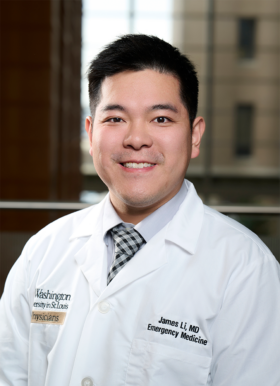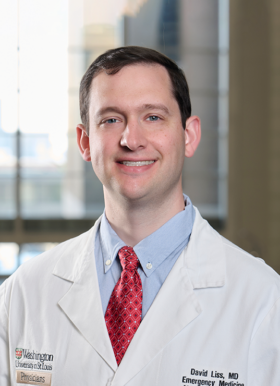EMS elective
The Emergency Medical Services (EMS) elective is hosted by the Division of EMS within the Department of Emergency Medicine. EMS is a subspeciality of medicine that focuses on the care of patients in the prehospital setting. EMS physicians provide direct and indirect medical direction, build systems of care, and treat patients in the prehospital setting. EMS cares for patients of all ages and all acute medical problems.
This elective offers students an immersive experience through observational ride along shifts with local EMS agencies, time with EMS physician medical directors, and self-directed learning assignments. EMS conference is held Friday mornings and includes didactics, workshops and simulations with EMS faculty, EMS fellows and emergency medicine residents.
Interested applicants should contact:

James Li, MD, MEd
Associate Program Director, EMS Fellowship; Assistant Professor, Emergency Medicine
- Email: l.james@nospam.wustl.edu
Toxicology elective
The toxicology rotation is open to both medical students and residents from a variety of different specialties and interests. The goal of the medical student rotation is to build the bridge between the basic sciences and the clinical years.
At the end of the rotation, medical students and residents are expected to be able to explain the pathophysiologic mechanisms underlying the development of a toxidrome as well as recognize the clinical presentations of some of the most common overdoses we see at the bedside. They should also be able to evaluate and initiate treatment in patients with substance use disorders, including opioid and alcohol use disorder. We hope to give them a solid foundation as they will be taking care of these patients on the floor and potentially in hospitals without medical toxicologists. We regularly have dozens of rotators on the service each year. Rotators receive a core set of lectures while on the rotation. They actively evaluate patients at the bedside and are given the option of participating in clinic.
In addition to regular didactics, we hold a formal didactics session every week. Topics vary and include classic and current journal articles and textbook chapters as well as presentations. Presentations include the management of interesting cases and general principles of medical toxicology. In addition, outside speakers may deliver lectures and toxicologists from the St. Louis region regularly join in the sessions. Rotators can also participate in our Scholar Track sessions and trips to the herpetarium, botanical gardens or Bayer.
The rotation is highly popular with both residents and medical students. Additionally, multiple graduates have gone on to excellent medical toxicology training fellowships because of their experience at Washington University.
Rotation documents
- Directions to Toxicology suite
- Medical Student Rotation Guide
- Rotator Orientation
- Toxicology Core Curriculum 2021-2022
- After your rotation ends, please provide feedback on the Toxicology Rotation
Interested applicants should contact:

David Liss, MD
Division Chief for Medical Toxicology; Program Director, Medical Toxicology Fellowship; Associate Professor, Emergency Medicine
- Email: lissd@nospam.wustl.edu
Administrative support: Sara Delatte
Ultrasound elective
This rotation will focus on ultrasound and all of its many applications and uses in the Emergency Department. Students will participate in the performance of bedside ultrasound of ED patients. Common applications of emergency ultrasound include the FAST exam, pelvic ultrasound, Abdominal Aortic Aneurysm (AAA), vascular access, renal, gallbladder, and DVT. In general, the student will be in the ED during weekdays to perform these exams. Students will not be involved in direct patient care during this rotation. Students will have access to a lecture bank of the common applications.
In addition, the student will meet with the ultrasound director one to two times per week to review images and have direct hands-on instruction. At the end of the rotation, the student should have gained the knowledge of basic emergency ultrasound including its indications and applications, as well as becoming more adept at the performance of ultrasound. Learn more about the rotation on POCUS Hub.
Outpatient: 80%
Conferences/lectures: 20% / 100%
Primary care: 40%
Subspecialty care: 60% / 100%
Average number of patients seen each week: ~25 ultrasounds/week
On-call/weekend responsibility: None
Who is responsible for major teaching: Laura Wallace, MD, lauraawallace@wustl.edu
Contact person: Christy Cox, 314-273-0233
Office location: Barnard Building, 8th floor, Phone: 747-4156, Fax: 314-362-0478 Campus Box 8072
Weeks offered (refer to enclosed calendar): Weeks 1, 5, 9, 13, 17, 21, 25, 29, 33, 37, 41
Capacity per period: One upper level student per period; more than one may be considered on a case by case basis
Location to report on first day of elective interval: Emergency Department, Barnes Jewish Hospital
Time to report on first day of elective interval: 10 a.m.